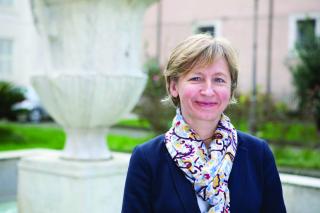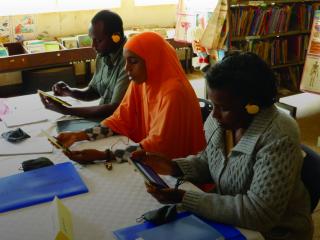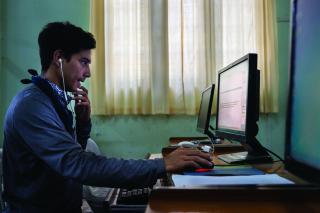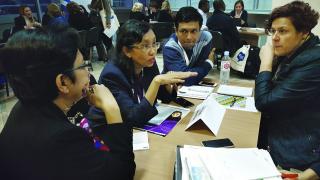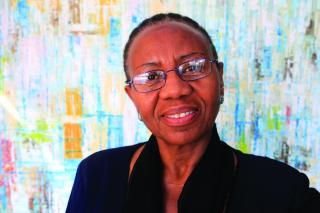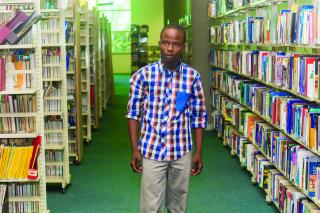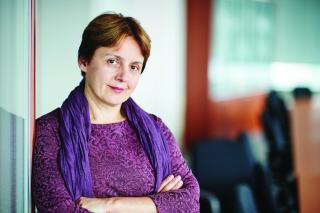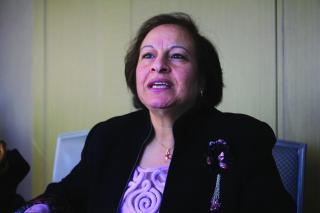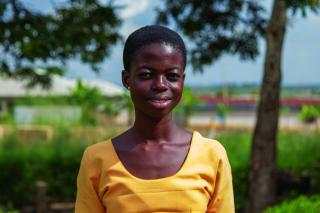2016 saw intensified discussion on internet inclusion, triggered by the ambitious targets set in the UN’s 2030 Agenda for Sustainable Development, which aims to achieve universal internet access.
Today, 50% of the world’s population remains offline. Recent research reports have agreed that the key barriers to internet access are lack of infrastructure, affordability, non-existent or poor digital skills, and limited awareness of the internet and its content.
During the year, EIFL joined in discussions of the US government-led Global Connect Initiative, which advocates for international development banks and governments to prioritize internet access in their development agendas. We were pleased that this initiative’s Guiding Principles assert the importance of public libraries in helping to get people connected.
In this report, we feature the EIFL Public Library Innovation Programme’s work in Kenya, where all public libraries now provide public access to computers, free internet and skilled staff to guide people in discovering the internet and the opportunities it offers. The remarkable transformation of public libraries in Kenya would not have been possible without the Kenyan government’s vision and investment in infrastructure.
There were other exciting global developments that have profound implications for access to knowledge and the improvement of lives. In September, we joined in celebrations as the Marrakesh Treaty entered into force. The Treaty transforms access to reading materials for the world’s 285 million blind and visually impaired people. In countries that have ratified the Treaty, libraries have the right to reproduce printed works in accessible formats, like braille and audio, and to share these copies across borders.
The EIFL Copyright and Libraries Programme was involved in all stages of the Treaty, from negotiations to adoption. Now we look forward to supporting further ratification and implementation of the Treaty in our partner countries.
We were also pleased with the results of the EIFL Open Access Programme’s advocacy which resulted in the adoption of open access policies by research funding agencies in three EIFL partner countries – Lithuania, Serbia and Georgia. The Research Council of Lithuania, the Ministry of Education, Science and Technological Development in Serbia and the Shota Rustaveli National Science Foundation in Georgia now mandate publication of their funded research in open access, so that it is freely available on the internet.
We follow reforms in Myanmar closely, and their impact on higher education. Libraries at nine universities have joined together to form a consortium, the Myanmar Academic Library Consortium, which is open to new membership. Through the new consortium, many more students, researchers and faculty will have access to e-resources made available by the EIFL Licensing Programme.
I hope that the stories included in this report give you a flavour of our work. Thank you to everyone who helps to bring us closer to achieving our vision – our partners and funders, our board members and our enthusiastic and committed staff.
Six years of partnership between EIFL and Kenya National Library Services reaches a major milestone.
In October 2016, 41 young Kenyans were awarded certificates after completing an eight-week online course in web design and resume writing at their local public library.
Dan Momanyi, a learner in Nakuru Public Library’s Learning Circle Programme, was one of the certificated learners. He is starting a small web development company: “The skills I have learnt in the library, and the certificate, which confirms that I have successfully completed the course, will give me an advantage in the market. The library has put me on the right path,” he said.
Just six years ago, it would not have been possible for Dan to take an online course at his public library. In 2010, fewer than five of Kenya’s 61 public libraries had internet connections or computers for public use.
In the perception study of public libraries in Kenya commissioned by EIFL in 2010, the majority of library users and non-users saw libraries as places for books and children to do their homework. Just 7% of people surveyed associated libraries with information and communications technology (ICT).
Today, all 61 public libraries in the Kenya National Library Service (KNLS) network have 10 or more computers that are connected to the internet, and which are free for the public to use. The number of people using libraries increased dramatically with the arrival of computers and the internet. Over half a million people have used computers and the internet in their local libraries in the last four years.
A REMARKABLE JOURNEY
The transformation of libraries in Kenya has been remarkable, and EIFL is proud to have been a partner with KNLS, the body that develops and manages libraries in Kenya, on this journey.
Guided by the findings of the perception study, EIFL and KNLS developed a strategy for changing public and government perceptions of public libraries. The strategy included advocacy, capacity building of public librarians, and development of new public library services that address community information needs.
The strategy worked. In February 2016, KNLS announced that the Communications Authority of Kenya had agreed to equip the remaining 46 public libraries with computers and the internet.
EIFL’s capacity building initiative, which included basic and advanced ICT as well as new service development and management skills, ensured that public librarians were prepared for the roll-out of equipment.
“I have visited a number of primary and secondary schools; I have also visited our local government offices to tell them all about the new services that the library is offering through use of the internet. As a result, many new groups of people are coming to the library, and our library membership has increased,” said Kateta Eunice Ngina, a librarian at KNLS Werugha Community Library.
FARMERS’ INFORMATION
Working with the Ministry of Agriculture and the University of Nairobi, KNLS is now providing an information service for the country’s 4.5 million farmers. Through the National Farmers’ Information Service (NAFIS), farmers can get information online or by phone about government extension services, farming methods, markets and market prices.
The NAFIS server is hosted in KNLS Buruburu Public Library, and an agricultural information officer from the Ministry has been appointed to liaise with KNLS to ensure that NAFIS content is up to date and that farmer inquiries are answered. Librarians at all 61 KNLS libraries reach out to farmers, encourage them to come to the library, and show them how to access the service.
“Through the use of ICT in my library, a vegetable farmers’ association has greatly improved their farming. They visit the library every Friday to search for information. Before, they used to plant only spinach and sukuma wiki (collard greens). Now they are also planting pumpkins after learning that pumpkins can do well here in Taita-Taveta County,” said a librarian at KNLS Werugha Community Library.
HEALTHY COMMUNITIES
In 2010, with EIFL support, two KNLS libraries, Kisumu and Eldoret, set up health information services. In less than a year, the two libraries trained over 1,600 health workers, students and members of the public to use ICT to access online health resources.
The idea caught on, and today, there are health hubs in 15 KNLS libraries, where health workers, medical students and members of the public can use rich collections of books and find information online.
Public libraries participate in government health campaigns, for example, on topics like HIV/AIDS, malaria prevention and the importance of good nutrition. They have also allied with academic health libraries to improve overall health literacy of the public, with a particular focus on non-communicable diseases, like cancer and diabetes.
Libraries regularly partner with nearby hospitals and clinics to host health awareness events for the general public, and have become important meeting spaces for people who have health issues in common and who have formed support groups.
“We have become recognized by the health sector. In May 2016 we organized a medical camp that attracted over 2,000 health workers, academics, students and members of the general public,” said Moses Imbayi, a librarian at KNLS Kisumu Public Library.
QUALITY EDUCATION
In 2012, EIFL supported an education project in KNLS Kibera Public Library. The library received tablet computers pre-loaded with curriculum content, tests and other educational content in fun formats like animations and puzzles, and started classes for children from schools in Kibera, a giant slum on the outskirts of Nairobi.
After a year, over 50% of the children who attended classes in the library reported that their school test results in English, mathematics and science had improved.
The project won international recognition, and KNLS received funding from an international agency to replicate the project in five more libraries.
As well as using tablet computers, KNLS libraries are increasingly integrating e-readers into educational services for children. To date, KNLS has distributed 2,100 e-readers and 175 tablet computers to 40 libraries. KNLS plans to equip all the libraries in its network with e-readers with books for children and adults in Kiswahili and English.
“Digital technology has changed the way we work. We are able to offer a greater variety of services to people in our community, for example supporting children who are struggling at school,” said Mary Kinyanjui, librarian at KNLS Kibera Public Library.
DIGITAL SKILLS
Poor digital literacy remains a key barrier to internet use today, according to the most recent surveys conducted on the African continent. Public libraries have an important role to play in providing access to digital technology and teaching people to use it.
Public librarians in the KNLS network have trained 170,000 people to use ICT since 2012. In addition to providing training, librarians assist individuals to find information online, to access e-government services and complete tax returns, and to apply for university courses or look for jobs.
“I am proud to be empowered to offer ICT training to other people and to be able to help them use software like Word, Excel and email. I am able to change others through this training,” a librarian from KNLS Meru Public Library told us.
KNLS has also recently entered into a partnership with Microsoft, and KNLS libraries have become access points for the Microsoft Imagine Academy, which grants industry-recognized certificates for people who complete technology skills courses. “This is a great opportunity, especially for Kenyan youth, to develop their technology skills and get globally recognized certificates right in their village,” said KNLS Director, Richard Atuti.
THE FUTURE
KNLS is open to new partnerships that will use public library ICT in programmes and initiatives to meet community information needs.
“Libraries must innovate and transform or they will become irrelevant to the community,” said Mr Atuti.
EIFL’S WORK WITH PUBLIC LIBRARIES IN KENYA
2010
- Commissioned research ‘Perceptions of public libraries in Kenya’
- Health services launched at Eldoret & Kisumu libraries
2011
- Released findings of ‘Perceptions of public libraries in Kenya’
2012
- Advocacy campaign for government investment in library ICT
2013
- Tablet-based children’s education services launched at Kibera & Busia libraries
2014
- Launched capacity building initiative for 29 public libraries
2016
- 29 libraries report providing digital skills training to 20,000 people
- 29 libraries report helping 220,000 individual library users to use ICT
- ICT learning services for deaf and autistic children launched at Meru library
- Services for visually impaired students launched at Nairobi Area library
- Virtual Online Math learning programme launched at Nakuru library
- ‘Learning Circles’ launched at Buruburu & Nakuru libraries
I have witnessed massive transformation of public libraries in Kenya. In the past, they were seen as reading rooms. Today, they are spaces offering free access to ICT and many different opportunities. EIFL has been with us all the way on this incredible journey.
The creation of the Myanmar Academic Library Consortium (MALC) late in 2016 heralds a new era of collaboration for academic libraries in Myanmar, and increases access to knowledge for students, researchers and faculty across the country.
Through the EIFL eLibrary Myanmar project, MALC members have access to over 15,000 full-text scholarly journals, more than 140,000 academic e-books, and a vast range of other materials.
The consortium was formed through an intensive learning programme organized by EIFL. Myanmar library leadership attended consortium-building workshops and travelled abroad to learn from experienced EIFL partner consortia.
MALC’s nine founding members are the Universities’ Central Library, University of Yangon, Dagon University, Yangon Economic University, East Yangon University, West Yangon University, Mandalay University, Yadanabon University and Yezin Agricultural University.
Membership of MALC is open to all academic and research institutions in Myanmar. News about the benefits of membership has spread, and many institutions have expressed interest in joining the consortium.
MALC gives us the framework for including other institutions in Myanmar, so that we can make sure that we are developing together and not leaving anyone behind.
University librarian, Maseru, Lesotho
Professor Matseliso Moshoeshoe-Chadzingwa, University Librarian at the National University of Lesotho and chairperson of the Lesotho Library Consortium (LELICO), has taken the lead in engaging with policy makers in copyright law reform in Lesotho.
Lesotho’s copyright law – the Copyright Order of 1989 – was adopted when the country was still under military rule. “The law was not assessed comprehensively to ensure that it would serve all stakeholders, including libraries,” said Prof. Moshoeshoe-Chadzingwa.
In 2016 EIFL undertook a legal review of the Copyright Order of 1989, while LELICO engaged the Lesotho Registrar General’s Office and other government ministries in discussion about changing the law.
“The Registrar General’s office has set up a committee to follow up on our recommendations which address issues librarians face in supporting education and performing their duties in the 21 st century. In light of the Marrakesh Treaty, our recommendations also cover the needs of blind and visually impaired people.
“We now have an action plan and we are looking forward to taking the legal review further in 2017,” said Prof. Moshoeshoe-Chadzingwa.
Copyright is not an easy subject; we believed it was for lawyers. Now we realize that as librarians we can take part in reviewing laws and be successful in recommending changes.
Student, University of Botswana, Gaborone
One day, when he was 15, Gorata Matome woke up to find a large dark spot in his vision. “From that day forward, I was partially sighted,” he said.
Today, aged 22, he is a third-year student of Environmental Studies and English at Botswana University. Studying is a struggle, because the library has very few books in accessible formats like braille, large print or audio. “I rely on librarians and friends to read books and articles for me,” he said.
But the future looks bright. In 2016 the Marrakesh Treaty entered into force, and Botswana was among the first 25 countries to ratify the Treaty. The Treaty gives organizations like libraries the right to reproduce printed works in accessible formats and to exchange these works across national borders. EIFL has been a strong advocate for ratification of the Marrakesh Treaty and its implementation into national law.
Once the Treaty has been implemented into Botswana’s copyright law, blind and visually impaired people will have access to thousands more books.
“The Treaty will help all visually impaired people – starting from primary, junior and senior schools. We will be able to compete equally with people who can see, and many more of us will be able to enter professions like law and medicine,” said Gorata.
Research funder, Lithuania
Professor Rūta Petrauskaitė, vice-chair of the Research Council of Lithuania (RCL), was one of the prime motivators for development of the RCL’s ‘Guidelines on Open Access to Scientific Publications and Data’, which were adopted early in 2016.
EIFL has been raising awareness about open access (OA) in Lithuania since 2005, working with the Lithuanian Research Library Consortium.
As a result of advocacy led by the consortium, Lithuania’s Law on Higher Education and Research (2009) requires OA to all publicly-funded research. However, the law did not sufficiently influence practice.
The European Commission-funded project, PASTEUR4OA, where EIFL and RCL were partners, offered an opportunity for Lithuania to develop OA guidelines aligned with those of other European Union member states and the European Commission.
“The 2016 RCL guidelines ensure that OA is practiced in Lithuania. When drafting research proposals for submission to the RCL, scientists must consider openness of research outputs. Since the guidelines, there has been a good increase in the number of publications deposited in OA repositories,” said Professor Petrauskaitė.
Library director, West Bank, Palestine.
Diana Sayej Naser, director of Birzeit University Main Library, is a passionate advocate for open access, which has special significance in Palestine, a divided country with restrictions on movement between its two parts, the West Bank and Gaza.
The restrictions make it difficult for scholars to meet to share knowledge, and open access helps overcome this challenge.
In 2015/2016 EIFL travelled to Palestine and organized a series of workshops that resulted in adoption of an institutional repository policy by the Birzeit University council and the creation of an open access repository, titled ‘FADA’.
Since the launch of the repository in October 2016, the library reports that enthusiastic members of the university community have deposited over 3,500 publications, including journal articles, research papers, books and rare books, theses and dissertations.
In 2017 the number of works deposited into FADA is expected to grow as Birzeit University fully embraces open access, and depositing work in the institutional repository becomes central to faculty promotion and evaluation of research.
School student, Abountem village, Ghana
When she completes school, Esther wants to be a television news presenter. But she had doubts about the future: she was not certain she would pass the Basic Education Certificate Exam (B.E.C.E.) – the gateway to secondary school.
Like many schools in poor and rural areas of Ghana, Esther’s junior school did not have computers, internet or reliable electricity. Information and communication technology (ICT) was taught in the abstract, and every year, many children failed their ICT exam at B.E.C.E. level.
In 2016, with EIFL support, four regional mobile libraries (Ashanti, Western, Upper East and Volta regions), travelled hundreds of kilometres over rough roads to 25 schools, bringing with them solar-charged laptops and internet connections. Working with teachers, they conducted hands-on computer classes, reaching over 3,800 children.
In August, when students received their B.E.C.E results, Esther was pleased to see her name on the list of those who had passed. She is now proud to be studying at Wesley Girls Secondary School.

